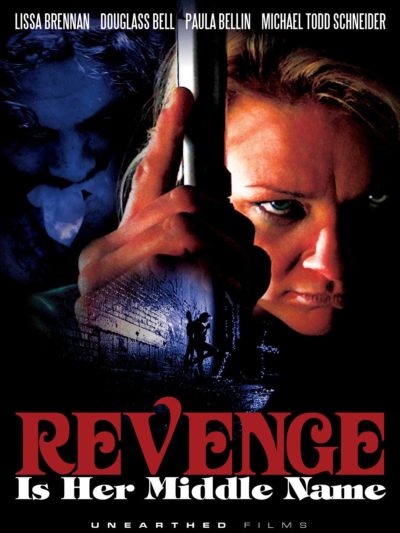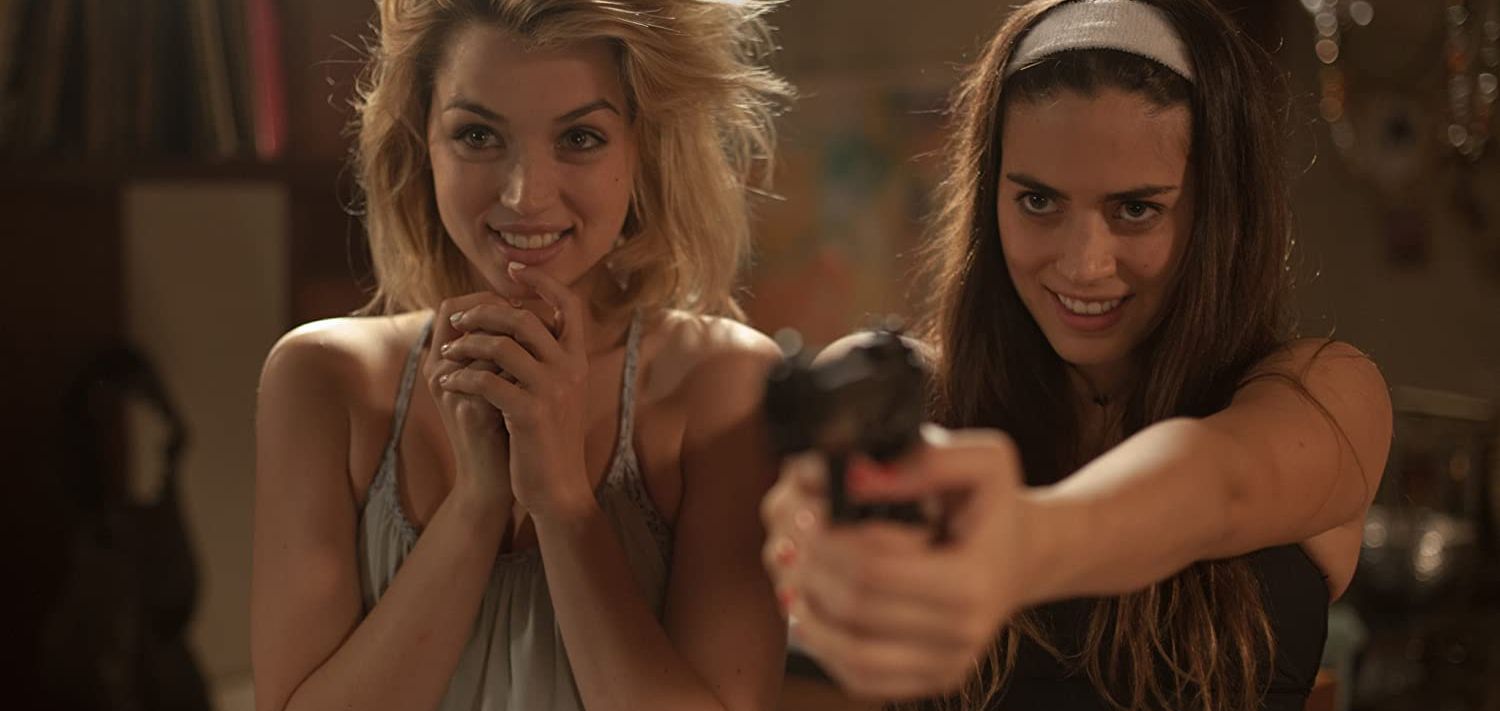★★
“Till death do she part.”
 Almost twenty years after her execution, Aileen Wuornos remains a cultural icon. A very rare example of a genuine female serial killer, she was killed by lethal injection in 2002, after being convicted of six murders, and confessing to a seventh. The following year, Charlize Theron won an Oscar for her portrayal of Wuornos in Monster, though for me, the film about the killer which is the best, is Nick Broomfield’s, Aileen Wuornos: The Selling of a Serial Killer. It certainly deserves to be ranked among my favorite documentaries of all time, along with its post-execution follow-up, Aileen Wuornos: Life and Death of a Serial Killer. Any other version is going to have an uphill struggle in comparison, and this peters out into a trashy, tabloidesque tale, with perilously little connection to reality.
Almost twenty years after her execution, Aileen Wuornos remains a cultural icon. A very rare example of a genuine female serial killer, she was killed by lethal injection in 2002, after being convicted of six murders, and confessing to a seventh. The following year, Charlize Theron won an Oscar for her portrayal of Wuornos in Monster, though for me, the film about the killer which is the best, is Nick Broomfield’s, Aileen Wuornos: The Selling of a Serial Killer. It certainly deserves to be ranked among my favorite documentaries of all time, along with its post-execution follow-up, Aileen Wuornos: Life and Death of a Serial Killer. Any other version is going to have an uphill struggle in comparison, and this peters out into a trashy, tabloidesque tale, with perilously little connection to reality.
It does have an interesting structure, with a Broomfield stand-in (Sturgeon) interviewing Wuornos, the night before her execution. At this point, the killer is played by Ashley Atwood, and the make-up crew have done an amazing job, along with Atwood’s capturing of her target’s mannerisms. Wuornos then tells the interviewer the story of her short-lived marriage to yacht club president Lewis Fell (Bell), almost five decades her senior. During this, she confesses to several murders, including that of her brother, though the interviewer pulls her up, as her version doesn’t align with the known facts. This “unreliable narrator” element has potential, but is rapidly discarded – a shame, as what the film offers instead is rather pedestrian.
Overall, it’s not much more than a truish-crime take on pot-boilers like the Poison Ivy franchise, in which attractive young gold-diggers embed themselves in families, before revealing their murderous natures. Here, the young Wuornos (List), considerably more attractive than the Death Row version, charms her way into marrying Fell after just a couple of weeks, much to the concern and chagrin of his daughter, Jennifer (Hearst). We’ve already established Wuornos’s violent tendencies, and these escalate until she murders the family lawyer, who threatens to expose what he has uncovered about her past, unless she takes his cash offer and leaves town. It all builds to a late-night confrontation on a boat in a storm, which I’m fairly certain is entirely fictional.
Farrands has carved out a niche for himself in this kind of not-so-true crime movie, his previous subjects having included Ted Bundy, the Manson killings and O.J. Simpson. Maybe they are more than a shallow skim, with stories which are not largely made up, and provide more insight into their subjects. This has little to offer, and doesn’t have the enjoyably salacious elements of Poison Ivy, even when Aileen is consummating her marriage to her husband. If it had told the story of Wuornos’s whole life, especially with more from Atwood, it could have been worthwhile, especially if embracing the uncertainty around her version of events. Instead, the only real positive result was discovering the two Broomfield documentaries are on YouTube. Guess what I’m watching tonight.
Dir: Daniel Farrands
Star: Peyton List, Tobin Bell, Lydia Hearst, Hamish Sturgeon





 I must confess I have not seen Confessions of a Homicidal Prostitute, to which this is a sequel. It’s marginally possible, I suppose, that the character development, story and nuance were present there, and explain why these are all but entirely absent in its successor. I would not, however, be prepared to bet on it. I suspect the original was every bit as mean-spirited as this: and “suspect” is all I’ll ever do, because I won’t be making any effort to track it down. In fact, I probably wouldn’t watch it if my aged mother begged me to on her death-bed. Too harsh? Perhaps. Yet I don’t think I’ve ever seen a flat-out
I must confess I have not seen Confessions of a Homicidal Prostitute, to which this is a sequel. It’s marginally possible, I suppose, that the character development, story and nuance were present there, and explain why these are all but entirely absent in its successor. I would not, however, be prepared to bet on it. I suspect the original was every bit as mean-spirited as this: and “suspect” is all I’ll ever do, because I won’t be making any effort to track it down. In fact, I probably wouldn’t watch it if my aged mother begged me to on her death-bed. Too harsh? Perhaps. Yet I don’t think I’ve ever seen a flat-out 
 No-one does low-budget hyperviolence like the Japanese. Whether it’s pseudo-snuff like Guinea Pig: Flower of Flesh and Blood, or more fantastical entries such as
No-one does low-budget hyperviolence like the Japanese. Whether it’s pseudo-snuff like Guinea Pig: Flower of Flesh and Blood, or more fantastical entries such as  If you came into this with absolutely no previous knowledge (including the poster on the right!), you’d be forgiven if you spent the first forty minutes thinking this was an independent drama about the perils of professional dating life in the big city. Then, suddenly, it’s
If you came into this with absolutely no previous knowledge (including the poster on the right!), you’d be forgiven if you spent the first forty minutes thinking this was an independent drama about the perils of professional dating life in the big city. Then, suddenly, it’s  While ultimately hamstrung, not least by its limited resources – this cost a mere five thousand dollars – it does what low-budget films should generally tend to do. That is, go where their better-off siblings dare not tread. In this case, that’s the forbidden territory of religion. Two young, female missionaries, Amber (Durand) and Martha (Crosland) are going door-to-door, seeking souls they can save and bring into the body of their church – clearly Mormon, going by the reference to Salt Lake City among other things, though operating under a pseudonym here! While their attractive shape proves successful at getting them in the door, the residents who don’t live up to the ladies’ high moral standards are in for a shock. For the two kill non-believers, with Amber in particular, having a zero tolerance policy. And she considers herself “saved”, basically giving her a free pass to do anything necessary in the name of the Lord.
While ultimately hamstrung, not least by its limited resources – this cost a mere five thousand dollars – it does what low-budget films should generally tend to do. That is, go where their better-off siblings dare not tread. In this case, that’s the forbidden territory of religion. Two young, female missionaries, Amber (Durand) and Martha (Crosland) are going door-to-door, seeking souls they can save and bring into the body of their church – clearly Mormon, going by the reference to Salt Lake City among other things, though operating under a pseudonym here! While their attractive shape proves successful at getting them in the door, the residents who don’t live up to the ladies’ high moral standards are in for a shock. For the two kill non-believers, with Amber in particular, having a zero tolerance policy. And she considers herself “saved”, basically giving her a free pass to do anything necessary in the name of the Lord. This is the kind of film which makes for very uncomfortable date night viewing, simply because the situation presented is likely to lead to awkward conversations. Happily married architect Evan Webber (Reeves) has the house to himself for the weekend, his wife having gone with their two kids to the seaside, leaving him free to work on a project. A stormy night ensues, until a knock at the door, and he finds two lost young women, Genesis (Izzo) and Bel (de Armas), shivering on the doorstep. He can hardly make them stay there, so lets them in. Almost immediately, something is wrong, though initially this falls into the “Too good to be true” category. For they are nymphomaniac flight attendants, and inevitably – though after a credible struggle – Evan succumbs to their relentless charms.
This is the kind of film which makes for very uncomfortable date night viewing, simply because the situation presented is likely to lead to awkward conversations. Happily married architect Evan Webber (Reeves) has the house to himself for the weekend, his wife having gone with their two kids to the seaside, leaving him free to work on a project. A stormy night ensues, until a knock at the door, and he finds two lost young women, Genesis (Izzo) and Bel (de Armas), shivering on the doorstep. He can hardly make them stay there, so lets them in. Almost immediately, something is wrong, though initially this falls into the “Too good to be true” category. For they are nymphomaniac flight attendants, and inevitably – though after a credible struggle – Evan succumbs to their relentless charms.
 For most films. I’ve usually got a fairly good idea of what is likely to be the final review grade, inside about 30 minutes. It may drift half a star up or down, but it’s relatively rare for there to be more variation than that. This would be one such case, which started off as underwhelming, went through a brief surge of “Oh, yeah – I get it!” in the middle, before returning to the mediocrity from whence it came. At various points, this could have been anywhere between ★½ and (although briefly) ★★★★. Well done, I guess?
For most films. I’ve usually got a fairly good idea of what is likely to be the final review grade, inside about 30 minutes. It may drift half a star up or down, but it’s relatively rare for there to be more variation than that. This would be one such case, which started off as underwhelming, went through a brief surge of “Oh, yeah – I get it!” in the middle, before returning to the mediocrity from whence it came. At various points, this could have been anywhere between ★½ and (although briefly) ★★★★. Well done, I guess? Turns out, interesting is not the same as good or entertaining. Who knew? If you watch this unaware, as I did, you are certainly going to be very,
Turns out, interesting is not the same as good or entertaining. Who knew? If you watch this unaware, as I did, you are certainly going to be very,